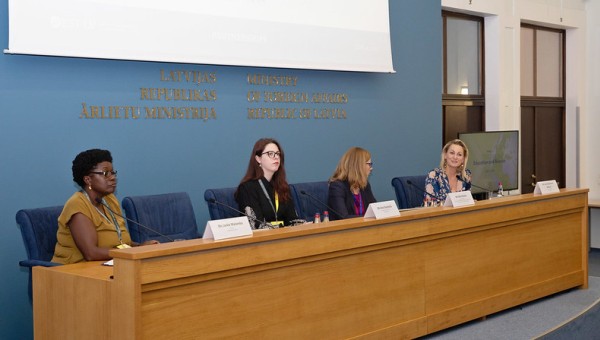Service Learning Welcomes Giovanni Visone from Intersos Humanitarian Organization
The JCU Service Learning Project welcomed Giovanni Visone, Head of Communications and Fundraising at Intersos to Professor Salvatore’s course “Made in Italy: the Italian Business Environment” on Wednesday, April 11. Intersos is an international non-profit organization, that fights humanitarian crises in 42 countries by working on the front line with children and minors in vulnerable and emergency situations. After providing a detailed overview of the aims of the organization, Visone focused on comparing corporate and social communication strategies.
Intersos’ activities in Italy not only include assistance on coastal boat routes, but also refugee center management in southern Italy and in Ventimiglia (Liguria, Italy). Intersos offers support to those children and adolescents who wish to relocate to northern Europe to either reunite with their families or escape the complicated bureaucratic Italian reception system. Sicily has 400 reception centers, 200 of which are dedicated to minors only. Visone recognized that these centers, which currently only offer food and shelter, need to improve their conditions and include psychological and legal support. Intersos is trying to address the recent political debate and reputational attack on Italian NGOs by offering solutions such as raising the quality of the information provided on migration and working on social inclusion with the local community to improve the sense of security.
Visone also clarified Intersos’ activity in Rome by stating that the city is currently not in a state of emergency, despite several isolated cases such as in summer 2017 when a group of migrants occupied a public building next to Termini train station. Intersos recently opened a new welcome center, Intersos 24 in Torre Spaccata, on the outskirts of Rome. The center offers counseling services, training workshops, and legal and medical support to refugee children and minors, as well as the local community. In this way, Intersos is trying to increase social inclusion by offering services that match the needs of both Italians and migrants. In addition, Intersos has established mobile teams to map the current situation in Rome and find informal meeting points for young migrants, where they can network, talk to social workers and find free Wifi and informational materials.
Visone concluded by analyzing the main objectives when communicating for social causes in an international non-profit organization. These include building awareness and doing fundraising, mainly focused on Italy – with examples such as Dona il 5×1000, SMS Campaigns, and the Roma Città Aperta campaign – or carried out through local media and PR of the host country. In addition, a second objective is advocacy, which means protecting peoples’ rights through concrete activities. The last objective is operational communications, such as the Young Pass initiative, which aims at customizing and tracking the records of young migrants to help them build their identity. The rules for social communications are: do not cause harm, respect the dignity of people and the local culture, always use clear and objective language, and adopt a positive tone. Visone also mentioned the sensitive topic of the ethical use of images. It is important to always consider ownership and include informed consent, while respecting the privacy of the people portrayed.






